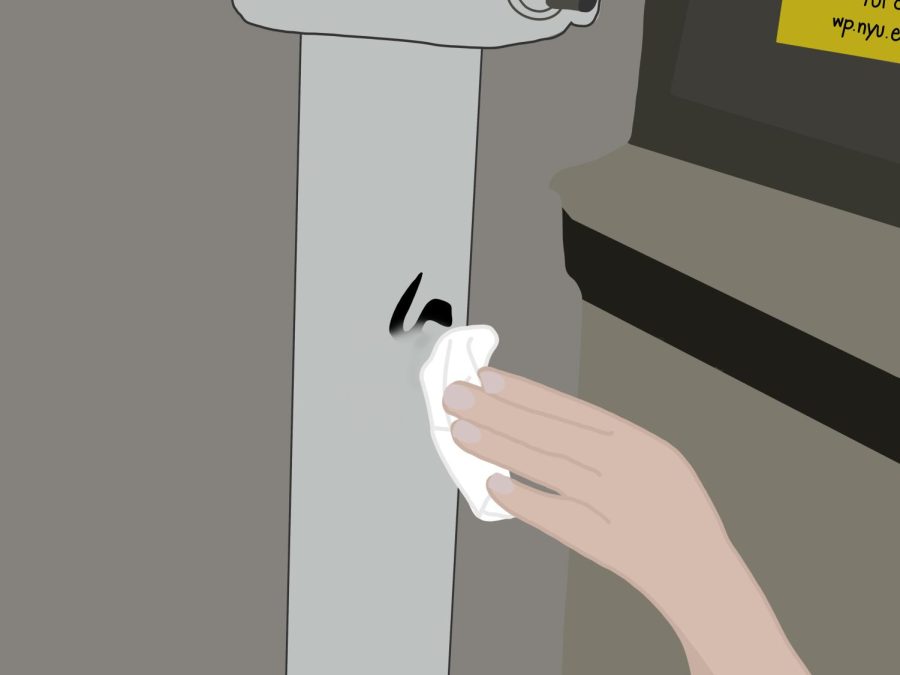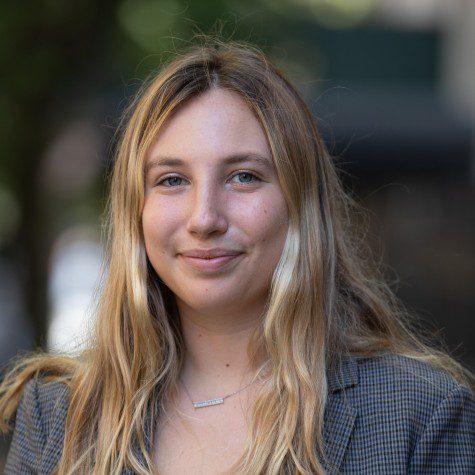Opinion: NYU, be more vigilant against antisemitism
Following the news that another campus building was marred by a swastika, NYU and its students need to take a stand against antisemitism.
NYU needs to work on supporting its Jewish community and fighting antisemitism on campus. (Staff Illustration by Camila Ceballos)
February 24, 2022
An institution of learning should have no space for hate. Our university resides in one of the most culturally diverse cities in the world and emphasizes inclusion. Our courses prompt a deeper understanding of people, places and ideas we might not otherwise interact with. And yet, this past week, NYU’s tokenization of diversity on campus was overshadowed by violence and hate.
A swastika was found on a Tisch building. This incident was followed with an inadequate response from the university. University spokesperson John Beckman condemned the vandalism and let Jewish members of the university community know that NYU “will continue to reject and oppose anti-Semitism.”
Important to note is the lack of meaningful response — the university needs to move beyond just an acknowledgement and take concrete action. This is not exclusive to antisemitism on campus. NYU has condemned hate against marginalized groups in the past, but seldom does more. The university rarely makes systemic changes to prevent prejudice from persisting. As important as Beckman’s condemnation was, simply stating that the university will “reject and oppose anti-Semitism” provides no comfort or concrete solution toward the protection of Jewish students on campus.
Jewish on Campus acknowledges that students must lead the fight against antisemitism and that we must speak out against these incidents. But what comes next? We can speak out, but to who? For what?
What we need is support from our educators and classmates and for our university administration to speak out with us on a larger scale. The words of Beckman and NYU bring me momentary comfort. But will they mean anything the next time something like this happens? In fact, mere statements by administrators has done little to address antisemitism in past incidents.
NYU has a hefty endowment that could fund programs and classes to educate students on the reality of contemporary and historical antisemitism and its prevalence on college campuses. However, education cannot resolve this problem alone. The administration could also extend more consideration to Jewish students by platforming student leaders and supporting the Jewish community at NYU as the ethno-religion it is, not just by providing programs and spaces for the religious aspect.
Earlier this week, I made a TikTok in which I acknowledged my Jewish faith and ethnicity. In the comment section, someone told me that I was killing Palestinians, which is not only blatantly untrue, but also extremely antisemitic. Someone’s Jewish identity does not give anyone the right to assume their stance on one of the most controversial and intricate conflicts on the world stage. Using the Jewishness of an individual as an open forum for criticism of Israel is dangerous and antisemitic. In implicating individual Jewish Americans as inherently causing violence against Palestinians, many people empower a famed antisemitic dogwhistle.
This type of interaction is far too common on TikTok and other social media platforms. Antisemitic sectors have gained traction on the app as Jewish voices have been censored and silenced. Antisemitism is omnipresent in spaces most visibly occupied by younger generations. It is more than likely that these attitudes will bleed into the real world and onto college campuses like NYU.
I’m a Jewish student at NYU and I feel unsafe on campus. Although I feel welcomed and accepted by the large Jewish community, I don’t feel supported by my own university or the student body at large. I cannot speak for all Jews as my experience is my own. However, I think many marginalized students at NYU would agree with me that NYU needs to be more proactive in addressing dangerous beliefs and actions.
As for NYU students, we must take action to make the university truly more inclusive. We must amplify marginalized voices not just in times of need, but constantly. We must condemn prejudice, even when it doesn’t directly affect us. We have the privilege of attending such a diverse school — that privilege comes with the duty of protecting and uplifting our vulnerable peers.
Contact Alexandra Cohen at [email protected]




























































































































































